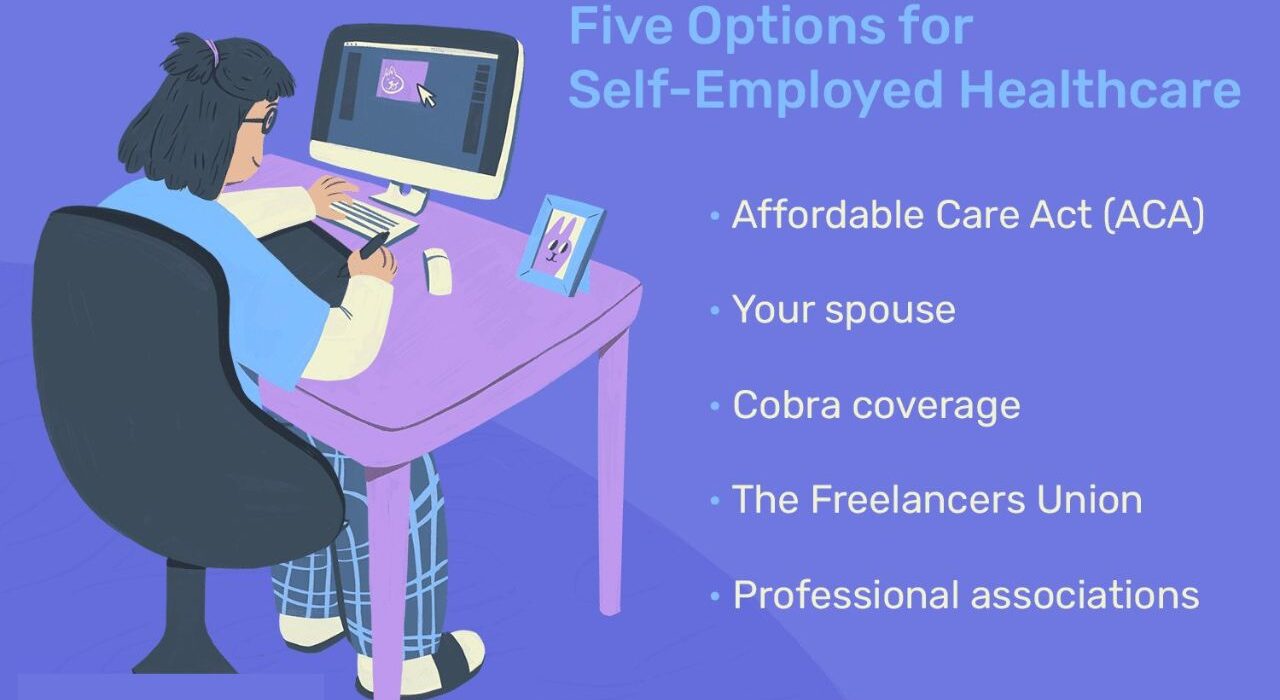Freelancers have several health insurance options, including private plans, health exchanges, and professional organizations. They can also explore short-term health plans or health-sharing ministries. Researching available options and comparing coverage and costs is crucial to finding the best fit for individual needs.
The Importance of Health Insurance for Freelancers
Health insurance is a crucial aspect of financial planning for freelancers, providing protection against unforeseen medical expenses. Unlike traditional employees who may receive health benefits through their employers, freelancers must navigate the complex insurance market independently. With proper coverage, freelancers can avoid facing significant financial burdens in the event of illness or injury.
Marketplace Health Insurance Plans
The Affordable Care Act (ACA) established health insurance marketplaces where individuals, including freelancers, can purchase coverage. These marketplace plans offer a range of benefits, including essential health benefits mandated by the ACA, such as preventive care, prescription drugs, and mental health services. Freelancers can explore different tiers of coverage based on their budget and healthcare needs, ensuring access to quality healthcare services.
Health Savings Accounts (HSAs) and Flexible Spending Accounts (FSAs)
Health Savings Accounts (HSAs) and Flexible Spending Accounts (FSAs) are viable options for freelancers seeking tax-advantaged ways to save for healthcare expenses. HSAs allow individuals to contribute pre-tax dollars to a designated account, which can be used to pay for qualified medical expenses, including deductibles, copayments, and prescription medications. Similarly, FSAs enable freelancers to set aside pre-tax funds for healthcare costs, providing flexibility and potential tax savings.
Freelancer Union Health Plans
Some freelancers may qualify for health insurance through freelancer unions or professional organizations. These collective bargaining agreements negotiate group health insurance plans on behalf of members, offering access to affordable coverage options with comprehensive benefits. Freelancer unions advocate for the rights and interests of independent workers, including access to healthcare benefits and resources.
Private Health Insurance Providers
Freelancers can also explore private health insurance providers to customize coverage according to their preferences and budget. By comparing quotes from different insurers, freelancers can identify policies that align with their healthcare needs and financial goals. Private health insurance plans offer flexibility in choosing providers, coverage levels, and additional benefits, empowering freelancers to tailor their insurance to suit their circumstances.
The Best Health Insurance Options for Freelancers
The Importance of Health Insurance
As a freelancer, you’re your own boss, setting your own hours and working on projects you’re passionate about. However, one crucial aspect that often gets overlooked amidst the freedom and flexibility is health insurance.
The Significance of Health Insurance cannot be overstated. It serves as a safeguard, ensuring financial security and access to essential medical care. Without it, individuals face the risk of significant financial strain and potential health crises. Securing adequate health coverage is paramount for a stable and healthy life.
Why Health Insurance Matters for Freelancers
Health insurance isn’t just a safety net; it’s a vital tool for ensuring your well-being and financial security. In the event of unexpected medical expenses or emergencies, having the right health coverage can make all the difference.
The significance of health insurance for freelancers cannot be overstated. It serves as a crucial safeguard, ensuring financial security and peace of mind in the face of unforeseen medical expenses or emergencies. Without it, freelancers risk facing significant financial hardship and stress.
Exploring Health Insurance Options
Regarding health insurance, freelancers have several options to consider, each with its pros and cons. Let’s delve into some of the most common choices:
-
Individual Health Insurance Plans
Individual health insurance plans are policies purchased directly from insurance providers. These plans offer flexibility in coverage and pricing, allowing freelancers to tailor their insurance to their needs. However, premiums can be higher than group plans, and coverage may vary depending on the provider.
-
Health Insurance Marketplaces
Health insurance marketplaces, such as the Affordable Care Act (ACA) marketplace, provide freelancers with access to a variety of health insurance plans from different providers. These marketplaces often offer subsidies based on income, making coverage more affordable for freelancers.
-
Freelancer Associations and Groups
Some freelancer associations and groups offer group health insurance plans to their members. These plans leverage the group’s collective bargaining power to negotiate better rates and coverage options. Joining a freelancer association can be beneficial not only for health insurance but also for networking and professional development opportunities.
-
Health Savings Accounts (HSAs) and Health Reimbursement Arrangements (HRAs)
HSAs and HRAs are tax-advantaged accounts that allow freelancers to save money for medical expenses. Contributions to these accounts are tax-deductible, and funds can be used to cover qualified medical costs. Pairing an HSA or HRA with a high-deductible health plan can provide freelancers with cost-effective coverage options.
Navigating the Selection Process
Choosing the right health insurance plan can seem daunting, but with careful consideration and research, freelancers can find coverage that meets their needs and budget. Here are some tips for navigating the selection process:
- Evaluate your healthcare needs: Consider pre-existing conditions, prescription medications, and anticipated medical expenses.
- Compare plans: Review the coverage options, premiums, deductibles, and out-of-pocket costs of different insurance plans.
- Look beyond the premium: While low premiums may seem attractive, consider the plan’s overall value, including coverage limits and network providers.
- Seek professional advice: If you need clarification on which health insurance plan is best for you, consider consulting with a licensed insurance broker or financial advisor for personalized guidance.
Some Points of Health Insurance Options for Freelancers

Best health insurance options for freelancers: Freelancers often seek health insurance options that provide comprehensive coverage while accommodating their flexible work schedules and varying incomes. These options typically include individual health plans offered by private insurers, health insurance marketplaces, or professional associations that cater specifically to freelancers.
Blue Cross health insurance cost for self-employed: Blue Cross Blue Shield offers health insurance plans tailored to the self-employed, with costs varying based on age, location, and the level of coverage chosen. Self-employed individuals can explore different Blue Cross plans to find the most suitable option that fits their budget and healthcare needs.
Health insurance for business owners: Business owners, whether operating as sole proprietors, partners, or incorporated entities, need health insurance coverage for themselves and often for their employees. They can explore options such as group health insurance plans, individual plans, or Small Business Health Options Program (SHOP) plans offered through state or federal exchanges.
Affordable health insurance for self-employed: Self-employed individuals often prioritize affordability without compromising on coverage quality. They may explore options like high-deductible health plans (HDHPs) paired with health savings accounts (HSAs), which offer tax advantages and flexibility in managing healthcare expenses.
The best insurance for self-employed: Determining the “best” insurance for self-employed individuals depends on budget, health needs, and preferences. Options may include individual plans from reputable insurers, plans offered through professional associations or chambers of commerce, or healthcare-sharing ministries for those seeking alternatives to traditional insurance.
Health insurance for LLC owners: LLC (Limited Liability Company) owners have various options for health insurance coverage, ranging from individual plans to group plans, depending on the size and structure of their business. They can explore options available through private insurers, state or federal exchanges, or industry-specific associations.
Health insurance marketplace: The health insurance marketplace refers to the platform established by the Affordable Care Act (ACA) where individuals and families can shop for and purchase health insurance plans. These marketplaces, also known as exchanges, offer a range of options from different insurers and often provide subsidies to lower-income individuals.
Private health insurance: Private health insurance refers to coverage provided by private insurers rather than government programs. These plans can be purchased individually or through employers, offering a wide range of coverage options and flexibility in choosing providers and healthcare services.
Conclusion
Navigating the landscape of health insurance options as a freelancer can be daunting, but with careful research and consideration, individuals can find coverage that meets their needs. From marketplace plans and health savings accounts to freelancer union health plans and private insurance providers, freelancers have a variety of options to explore. By prioritizing health insurance coverage, freelancers can safeguard their well-being and financial security, ensuring peace of mind as they pursue their professional endeavors.
FAQ
Which Insurance is Best for Self-Employed?
A comprehensive health insurance plan with flexible coverage options is often the best choice. Look for plans that offer good coverage for medical expenses, including doctor visits, prescriptions, and hospital stays, tailored to your needs and budget.
How Does Health Insurance Work for Freelancers?
Freelancers typically purchase health insurance directly from providers or through platforms like healthcare exchanges. They choose plans based on coverage needs and budget. Premiums are paid regularly; insurance covers medical expenses up to certain limits, with deductibles and copayments.
Is Health Insurance 100% Deductible for Self-Employed?
No, health insurance premiums for self-employed individuals are not 100% deductible. Generally, you can deduct a portion of your health insurance premiums as a business expense on your tax return, subject to certain limitations and qualifications under the tax code.
How Much Does Insurance Cost as a Freelancer?
The insurance cost for freelancers varies widely depending on location, age, health, and coverage needs. On average, freelancers expect to pay anywhere from $300 to $1,000 monthly for comprehensive health insurance coverage.
Is Health Insurance More Expensive for Self-Employed?
Yes, health insurance for the self-employed is more expensive than employer-sponsored plans. Self-employed individuals typically bear the full cost of premiums, whereas employers often subsidize a portion of their employees’ premiums, making group plans more affordable.
Does Health Insurance Reduce Self-Employment Income?
Health insurance premiums for self-employed individuals can be deducted from taxable income, reducing the overall tax burden. This deduction effectively lowers the amount of self-employment income subject to taxation, providing a financial benefit to the self-employed.




